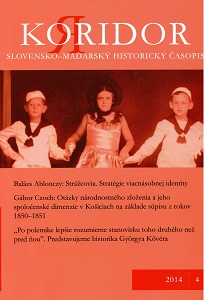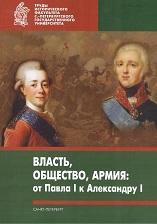
Miroslav Kmeť: Na margo dvoch storočí. Štúdie zo slovenských dejín 19. a 20. storočia
Book review: Miroslav Kmeť: Na margo dvoch storočí. Štúdie zo slovenských dejín 19. a 20. storočia
More...We kindly inform you that, as long as the subject affiliation of our 300.000+ articles is in progress, you might get unsufficient or no results on your third level or second level search. In this case, please broaden your search criteria.

Book review: Miroslav Kmeť: Na margo dvoch storočí. Štúdie zo slovenských dejín 19. a 20. storočia
More...
Book review: Miroslav Michela–László Vörös a kol.: Rozpad Uhorska a trianonská mierová zmluva. K politikám pamäti na Slovensku a v Maďarsku
More...
The decision by Paul to head the Order of St. John was a result of major changes in the Order which took place in the second half of the XVIII century. For most part Russian priories did not differ from the European ones. Russian tsar used the founding of the Hospitallers, to help solve practical issues in his domestic and foreign policy problems. But it did have the appearance of staged performance. Because of the political situation at the time Alexander chose not to lead the Order, but he still preserved the Russian priories until 1810, at which time they were abolished primarily due to the fi nancial crisis in Russia at that time.
More...
The purpose of the article is to analyze a policy of the imperial centralism regarding Poles and Jews, which was carried out by N. N. Novosiltsov, an associate of Alexander I, in the Kingdom of Poland and the Western provinces of the Russian Empire in 1810–1820-s years.
More...
Work is devoted a question of number and typology of city settlements of last years XVIII century, which had (on legal norms and traditions of time) the offi cial status of a city are simultaneously considered, and concerned other types, but related (from the point of view of contemporaries) to cities.
More...
This article is devoted to the participation of the offi cer corps of Russian army in the Foreign marches 1813–1814 years. Events of 1813–1814 years represented in letters, journals, memoirs are refl ected in the perception by their direct participators. Besides the descriptions of the battles, the scenes from military lire, the authors of the memoirs introduce us with the descriptions of the everyday life and a mode of life of the other countries, give us bright characteristics of their inhabitants.
More...
In his article author analyzes the problem of the political future of France in 1813–1814 years and the Emperor Alexander’s role in the discussions about it. The author focused on the most complex diplomatic struggle erupted between the participating countries VI anti-Napoleonic coalition on the future ruler of France after the fall of Napoleon and the Russian czar position on this issue.
More...
In this article author summarizes facts and appraisals, extracted from new-discowered memoires by famous leader of Decembrist movement prince S. P. Trubetskoy. This facts regard to history of Secret societies of Decembrists and reflect a public stile of mined 1810–1820-s, also social attitude progressive part of Russian intellectuals to governmental policy at home and abroad.
More...
In the article reviews the episode of the French influence unknown earlier on Russian military practice in the beginning of XIX century. In 1804 D. V. Golitsyn is considered has published cavalry manual which was actively used in training in Russian cavalry regiments. Researchers considered till now D. V. Golitsyn’s charter as original work. However, as a part of funds of Pushkin reserve “Mihajlovsky” the copy of the French cavalry charter of 1801 from D. V. Golitsyn’s library which testifi es to its preparation for the edition in Russian is found out.
More...
Educational reforms of Alexander I began the formation and the development of the unifi ed system of education in Russia. In that time there was a considerable increase of number of schools and a great amount of schoolchildren in the country. But there were many problems at the stage of formation of system of education: poor fi nances of schools, bad training of specialists, how well schools were provided with books, bad school conditions, society’s misunderstanding of benefit of children’s literacy.
More...
Alexandre Balashov (13 July 1770 – 8 May 1837) — an outstanding Russian general and statesman. At the begining of the XIX-th century he was close to emperor Alexander I, occupied a number of high posts and had infl uence on home and foreign policy. The purpose of the article is to analyze the fi rst period of Balashov’s carrier when he was appointed the chief of police in Moscow and when his political views were formed.
More...
The author presents military settlements in Russia of the nineteenth century not as «the worse form of serfdom», but as the rational element of the modernizational reformative policy of the Alexander I. Positive results of the development of the military settlements organization, fi nancial profi ts of state, development of economic infrastructure of the regions of its dislocation show on the basis of materials of researches of the military settlements institute and archives materials.
More...
The article is dedicated to the process of formation of images of Russian emperors Paul I and Alexander I in the historical memory of Russian society. Information received through opinion polls, analysis of fiction and educational literature as well as web-resources demonstrate the negligence towards these historical figures on the part of Russian national memory. In his article the authors investigate the reasons of Paul’s and Alexander’s unpopularity and restores the mechanism of formation of myths about them in the modern historical consciousness.
More...
The article devoted to governmental motives, purposes, tasks and specifi c implementation forms so called Governmental constitutionalism. As far as Charte Constitutionnelle of 1820 is top of «governmental constitutionalism » it shows fundamental principals of this policy such as autocracy, class regime, bureaucracy.
More...
The article deals with the works on Russian legislation systematizing under Emperor Alexander I reign. It also analyzes the process of civil code preparation, the struglle connected with the acceptance of the civil code project by M. M. Speransky and further destiny of this bill. Various points of view on the character of borrowings from the West European codes are presented in the article as well.
More...
The article aims to analyze how academic works explain the reasons for countrywide establishment and subsequent complete elimination of the post of Governor General in the public administration system of the Russian Empire in early 1820’s. The author provides specifi c examples, elaborating on the details of service of Governor Generals of Arkhangelsk, Vologda and Olonetsk provinces.
More...
Russian Empire in the 18th – fi rst half of 19th century included huge territories with population of many millions, however this fact did not imply contingent of recruitment increasing. The obstacles for recruitment at national outlying districts were their differences from “native provinces” and government’s uncertainty in new subjects’ loyalty.
More...
The article deals with the image of Paul I in the public conciousness formed by the folklore sources, such as: anecdotes of contemporaries, various gossip being current in the Imperor court and out of it. It is supposed thet these very sources became the base for making of the impartial reputation of governor Paul I during his life and after death.
More...
This manuscript “On Russian Constitutions” was opened at the archive of St.-Petersburg’s Institute of History of Russian Academy of Sciences among the papers of the collector I. A. Shliapkin. It is an account of the historian I.P. Saharov written by his nephew N.A. Belovodsky. According to it the 20 of January 1851 the historian A.N. Popov, the staff of II Department of H. M. I Chancellery, snowed to Saharov a manuscript of the constitution signed by Alexander I three days after his accession. According to it Alexander I signed this project of the constitution proposed him by D. P. Trostchinsky in three days after his accession, but V. P. Kochubey made change the mind of the young tsar. Send by him Kochubey took away the signed project, which the liberals didn’t publish yet, because they were drinking of happiness. Naivety of the account shows that it is an apocryphal thing. But Popov wrote a book about Alexander I during 15 years. It must be a special chapter about legislation of the tsar at the book. There were many original documents stolen from the archives among his papers after Popov’s death. We don’t know today where they are now. The Saharov’s account proves the fact very important. 1851 Popov had one of the constitution’s project of 1801. Indirect evidences let us propose that it was one of the project of “Chart to Russian People”, prepared to day of the coronation.
More...
There were different interpretations of the nature of The Union of Prosperity in Historiography: the Union was considered either as a liberal or revolutionary organization, or as an organization in transition. In this article the nature of the Union is considered on the basis of semantic analysis of the concept of prosperity.
More...